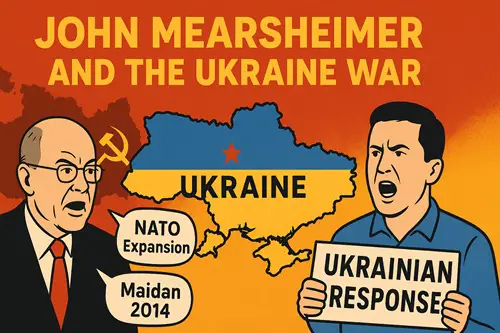|
TRANSLATE THIS ARTICLE
Integral World: Exploring Theories of Everything
An independent forum for a critical discussion of the integral philosophy of Ken Wilber
  Frank Visser, graduated as a psychologist of culture and religion, founded IntegralWorld in 1997. He worked as production manager for various publishing houses and as service manager for various internet companies and lives in Amsterdam. Books: Ken Wilber: Thought as Passion (SUNY, 2003), and The Corona Conspiracy: Combatting Disinformation about the Coronavirus (Kindle, 2020). Frank Visser, graduated as a psychologist of culture and religion, founded IntegralWorld in 1997. He worked as production manager for various publishing houses and as service manager for various internet companies and lives in Amsterdam. Books: Ken Wilber: Thought as Passion (SUNY, 2003), and The Corona Conspiracy: Combatting Disinformation about the Coronavirus (Kindle, 2020).
Check out my other conversations with ChatGPT John Mearsheimer and the Ukraine WarRealism or Russian Echo?Frank Visser / ChatGPT
 Few Western academics have attracted as much controversy during the Ukraine war as John Mearsheimer, the University of Chicago political scientist and leading theorist of “offensive realism.” His argument is simple but provocative: the war is primarily the fault of the West. By expanding NATO and encouraging Ukraine's drift toward the European Union, the United States and its allies left Moscow no choice but to act. Russia's invasion, in this view, was a tragic but predictable consequence of great-power politics. This framing has made Mearsheimer a lightning rod in debates about the war. Critics accuse him of spreading Russian talking points, even if unintentionally. Why does his analysis sound so similar to Kremlin propaganda? The answer lies in the intersection of his theoretical commitments and Moscow's own narrative. The Realist LensMearsheimer's intellectual framework rests on a few pillars:
From this vantage point, the West made a fatal error by promising NATO membership to Ukraine in 2008, supporting the Maidan uprising in 2014, and arming Kyiv after Russia annexed Crimea. Moscow's invasion in 2022, Mearsheimer insists, was not ideological but defensive—a response to the intolerable encroachment of NATO. Overlap with Kremlin Talking PointsThe problem is that this account closely mirrors the story Russia tells the world:
Of course, there are differences. Mearsheimer does not deny Russia's brutality, nor does he parrot Putin's talk of Ukraine as a “fake nation.” But the overlap is undeniable. Both shift responsibility away from Moscow and onto the West. Both deny Ukrainians much agency in their own history. Both present the war as a reaction to NATO, not a choice driven by Russian imperial ambition. This rhetorical convergence is why Mearsheimer's lectures are widely circulated on Russian state media. His academic authority lends legitimacy to the Kremlin's line, even if he insists his intent is explanatory, not apologetic. Scholarly CritiquesOther historians and political analysts push back sharply against this framing. They argue that:
As historian Timothy Snyder put it, Mearsheimer reduces Ukrainians to “objects of other people's history,” while the war is in fact about their struggle to assert their subjecthood. The Ukrainian ViewFor Ukrainians themselves, Mearsheimer's arguments strike a raw nerve. Intellectuals and officials have reacted with anger, seeing his theory as a dangerous denial of their reality:
To many in Kyiv, his insistence that the West is to blame amounts to victim-blaming. Ukrainians did not invade Russian territory, annex Russian land, or massacre Russian civilians. Yet Mearsheimer places the bulk of responsibility on NATO policies rather than on Moscow's decision to wage a war of aggression. Realism or Russian Echo?Mearsheimer insists he is simply following the logic of realism: explaining rather than justifying. But explanation is never neutral. By consistently downplaying Russia's imperial ideology and denying Ukrainian agency, his framing produces outcomes indistinguishable from Kremlin propaganda: blame the West, treat Ukraine as expendable, and accept Russian domination of its neighbors. For critics, this is not realism but reductionism—a theory that mistakes abstractions for reality and ends up excusing aggression. For Ukrainians, it is more dangerous still: an academic gloss on their erasure. ConclusionJohn Mearsheimer's arguments on the Ukraine war expose the limits of structural realism when confronted with the lived reality of nations struggling for independence. By privileging great-power rivalry over sovereignty, and security dilemmas over moral responsibility, he tells a story that resonates in Moscow more than in Kyiv. His analysis may be grounded in theory, but its consequences echo as propaganda. In the end, the war in Ukraine is not just about NATO expansion or balance-of-power politics. It is about the survival of a nation—something Mearsheimer's framework cannot fully grasp, but which Ukrainians themselves know all too well.
Comment Form is loading comments...
|